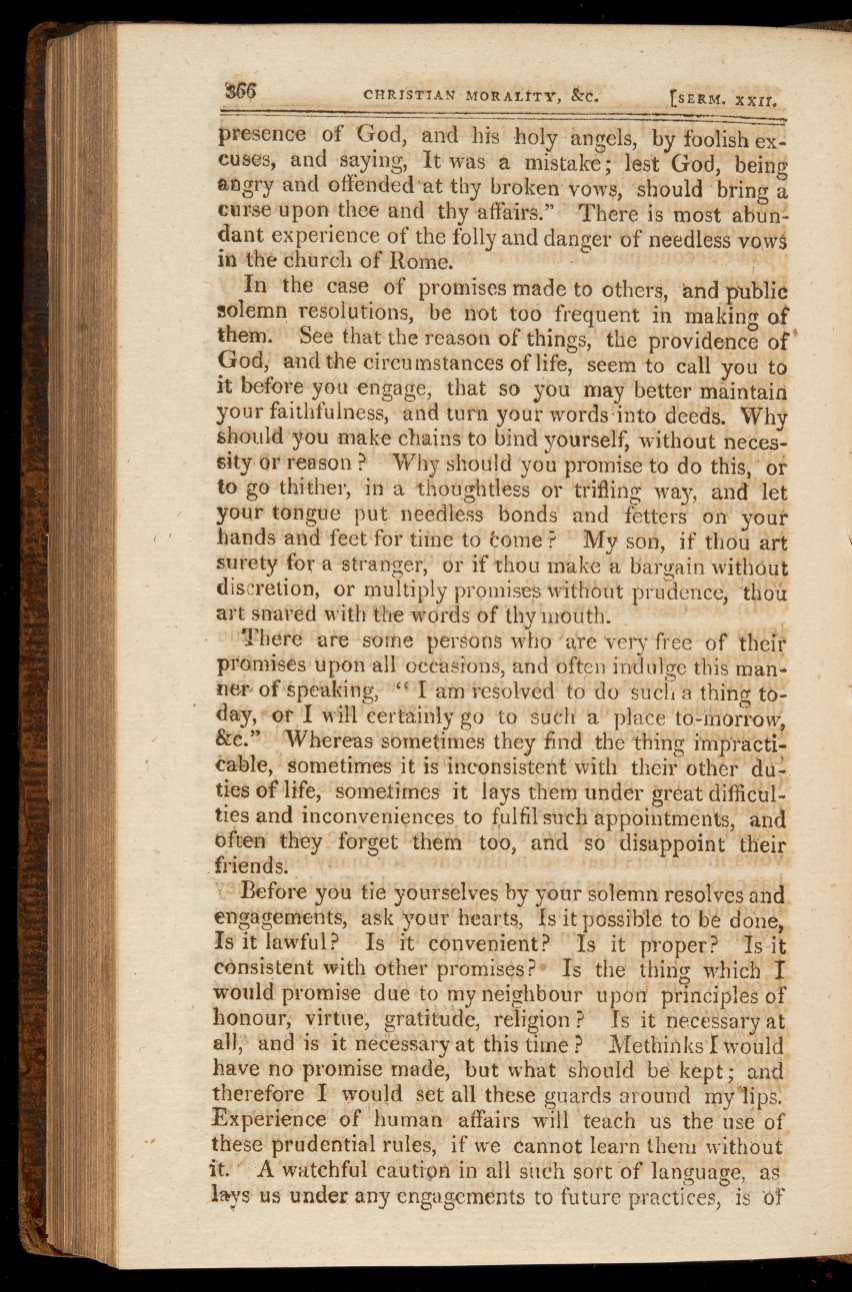

t66
CHRISTIAN MORALITY,
&r.
[SCAM.
xxrr.
presence
of God,
and
his
holy
angels, by foolish ex-
cuses,
and
saying;
It
was
a
mistake; lest God,
being
angry and
offendedat
thy
broken
vows,
should bring
a
curse upon thee and
thy affairs."
There
is
most abun-
dant
experience
of
the
folly
and danger
of
needless
vows
in the church
of
Rome.
In
the case
of
promises made to others,
and public
solemn resolutions, be
not too frequent
in
making
of
them.
See
that
the
reason
of
things,
the providence
of
God, and
the circumstances
of
life,
seem to call you to
it
before
you engage,
that
so
you
may
better maintain
your
faithfulness,
and
turn your
words
into
deeds.
Why
should
you
make chains
to
bind yourself,
without neces-
sity or reason
?
Why should
you promise to do this,
or
to
go
thither,
in
a thoughtless or
trifling
way,
and let
your tongue put
needless bonds and fetters
on
your
hands and feet
for time
to
come
??
My
son,
if
thou
art
surety
for
a
stranger, or
if
thou make a bargain
without
discretion, or multiply
promises
without prudence, thoú
art
snared
with
the
words
of
thy
mouth.
There
are
some
persons
who
"are
very free
of their
promises upon
all
occasions,
and often indulge
this
man-
ner-
of
speaking,
I
am
resolved
to
do
such
a
thing
to-
day,
or
I
will
certainly
go
to
such
a
place
to-
Morrow,
&c."
Whereas
sometimes they
find
the
thing
impracti-
cable, sometimes
it
is
inconsistent
with
their other
du-
ties
of
life,
sometimes
it
lays
them
under great
difficul-
ties
and inconveniences
to
fulfil
such
appointments,
and
often
they forget them too, and
só
disappoint their
friends.
Before you tie yourselves by
your
solemn resolves and
engagements, ask
your
hearts, Is
it
possible
to be
done,
Is
it
lawful?
Is it convenient? Is it proper?
Is it
consistent
with
other
promises?
Is
the thing
which
I
would promise due
to
my
neighbour upon principles
of
honour,
virtue, gratitude,
religion
?
Is
it
necessary
at
all,
and
is
it
necessary
at
this time
?
Methinks I
would
have
no
promise
made,
but
what should
be
kept;
and
therefore
I
would set
all
these
guards
around
my
lips:
Experience
of
human
affairs
will
teach
us
the
use
of
these
prudential
rules,
if
we
cannot
learn them without
it.
A watchful
caution in
all siich
sort
of
language,
as
lays us
under
any
engagements
to
future
practices,
is
of

















